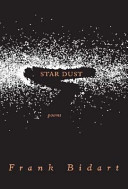
Star Dust
By - Bidart Frank
Floor
-
Floor 3
Published
-
Farrar, Straus and Giroux, New York, 2005
ISBN 10 - 0374269734
ISBN 13 - 9780374269739
Book Status
-
1 Qnty Available with us.
Subject
-
Poetry as Topic
Shelf No
-
2
Call Number
-
811.54 BID
Physical Description
-
88 pages ; 22 cm